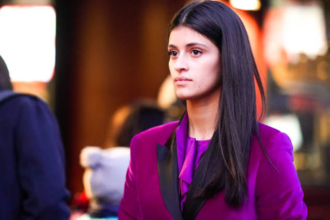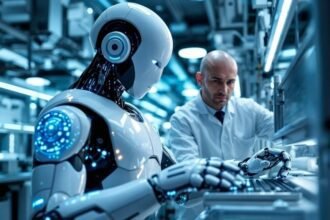The world of AI in filmmaking is evolving rapidly, and its influence is increasingly being felt in Hollywood. Recently, the Academy of Motion Picture Arts and Sciences made headlines with an important announcement: films made using artificial intelligence tools will be eligible for Oscar nominations. This marks a significant shift in the way we view filmmaking, where technology and creativity collide to push the boundaries of what is possible. As AI continues to enhance the creative process, it raises key questions about the future of film production and its impact on human artistry.
In this blog, we’ll explore the influence of AI in filmmaking, the Academy’s new rules regarding its use, and how it is shaping the future of the Oscars and the filmmaking industry. By understanding these dynamics, filmmakers can better navigate the intersection of technology and creativity in the years to come.
How Does AI Influence Filmmaking?
The role of AI in filmmaking has been growing steadily over the past decade, as filmmakers increasingly rely on AI tools to streamline production, improve performance quality, and create stunning visuals. From the early days of CGI (Computer Generated Imagery) to the latest advancements in machine learning and generative AI, these technologies have enabled filmmakers to push the envelope like never before. AI’s involvement in film production is not just limited to special effects or post-production—it’s making its way into pre-production, scriptwriting, casting, and editing.
For example, AI can assist in scriptwriting by analyzing patterns in successful screenplays and offering suggestions for plot development or character arcs. It can even help in developing dialogue that fits the tone of the story. In post-production, AI in filmmaking is used to refine audio, video, and visual effects, making editing faster and more precise. This can significantly reduce production timelines and costs, allowing for more films to be produced and released in a shorter period.
Additionally, AI is being used to enhance actor performances. AI tools can modify accents, improve voice clarity, or even alter vocal tones to match a desired character portrayal. This technology was notably used in films like The Brutalist, where AI was applied to improve actor Adrian Brody’s Hungarian accent. Similarly, AI tools are being used to refine the performances in musical numbers, such as those seen in the Oscar-winning film Emilia. These advancements showcase how AI in filmmaking can enhance the artistic vision of filmmakers and actors while reducing the time and resources traditionally needed to achieve the same effects.
What Are the Academy’s New Rules on AI in Filmmaking?
The rapid rise of AI in filmmaking has prompted the Academy of Motion Picture Arts and Sciences to reevaluate its rules regarding film eligibility. The Academy’s new guidelines are clear: films that use AI tools during production are not disqualified from being nominated for an Oscar, as long as human involvement remains at the center of the creative process. The Academy emphasized that AI is viewed as a tool, rather than a replacement for human creativity.
This is a significant step forward, as it acknowledges the value of AI in the filmmaking process without diminishing the importance of human input. With these new rules in place, filmmakers now have the opportunity to experiment with AI in filmmaking without worrying about their film’s eligibility for the Oscars. This move also reflects the Academy’s recognition of the growing role that AI plays in the industry, while ensuring that human artistry remains at the core of the film production process.
While AI can be used for various aspects of filmmaking, the Academy made it clear that the use of technology must not overshadow the creativity and vision of human filmmakers. The goal of these rules is to maintain the integrity of the Oscars as a celebration of human artistic achievement, even as AI becomes an increasingly prominent tool in the creative process.
What Are the Concerns About AI in Filmmaking?
While the benefits of AI in filmmaking are undeniable, the technology also raises significant concerns, particularly regarding the ethical implications of its use. One of the biggest worries among actors, writers, and directors is the potential for AI to be used to manipulate an individual’s likeness or voice without their consent. As AI becomes more capable of recreating voices and appearances, the fear is that it could be used to generate performances or scenes without the participation or approval of the original artist.
Actors have voiced concerns about the potential for AI to replace human performances altogether, especially if it becomes easier to use AI to digitally recreate an actor’s voice or likeness in post-production. Some worry that AI could be used to alter their performances in ways they did not approve, potentially diminishing their control over their image.
Another significant concern is the impact of AI in filmmaking on jobs within the industry. Many screenwriters, editors, and other creative professionals are worried that studios might use AI tools to replace human labor, especially for tasks such as scriptwriting, research, and editing. While AI can enhance these processes, it’s unlikely that it can completely replicate the nuance and emotional depth that human creators bring to their work. The fear is that as studios adopt these tools, they may increasingly prioritize cost-cutting over human creativity, which could lead to job losses in the industry. Read another article on the Meta AI copyright controversy.
The Future of AI in Filmmaking: What’s Next?
The future of AI in filmmaking is both exciting and uncertain. As technology continues to advance, AI will likely become an even more integral part of the filmmaking process, offering new tools and possibilities for filmmakers. From automated editing systems to AI-driven scripts, the potential for these technologies to revolutionize the industry is vast. However, as with any new technology, there will be challenges and ethical considerations to address.
One potential area of growth for AI in filmmaking is in virtual production. AI-driven tools are already being used to create more realistic virtual environments and digital doubles for actors, making it possible to film in completely computer-generated worlds. This is already being used in projects like The Mandalorian, which utilizes a combination of virtual reality, AI, and real-time rendering to create immersive digital sets.
However, as AI continues to evolve, it’s essential that filmmakers and industry professionals continue to balance the use of AI with the core values of human creativity. Filmmakers should approach AI as a tool that enhances, rather than replaces, their artistic vision. While AI can certainly help with certain tasks, it’s important to ensure that human artistry remains at the heart of the process.
Conclusion
As AI in filmmaking continues to grow, its impact on the industry will only increase. The Academy’s recent decision to allow AI-assisted films to be eligible for Oscars signals a new era in filmmaking, one where technology and creativity intersect in exciting new ways. While there are valid concerns about the ethical implications of AI, the technology itself has the potential to revolutionize how films are made, improving efficiency, creativity, and accessibility.
The key for filmmakers moving forward is to embrace AI in filmmaking as a tool—one that complements and enhances their creative vision. By doing so, they can ensure that the future of filmmaking remains innovative, while still preserving the artistry that has made cinema such a powerful medium for storytelling.








